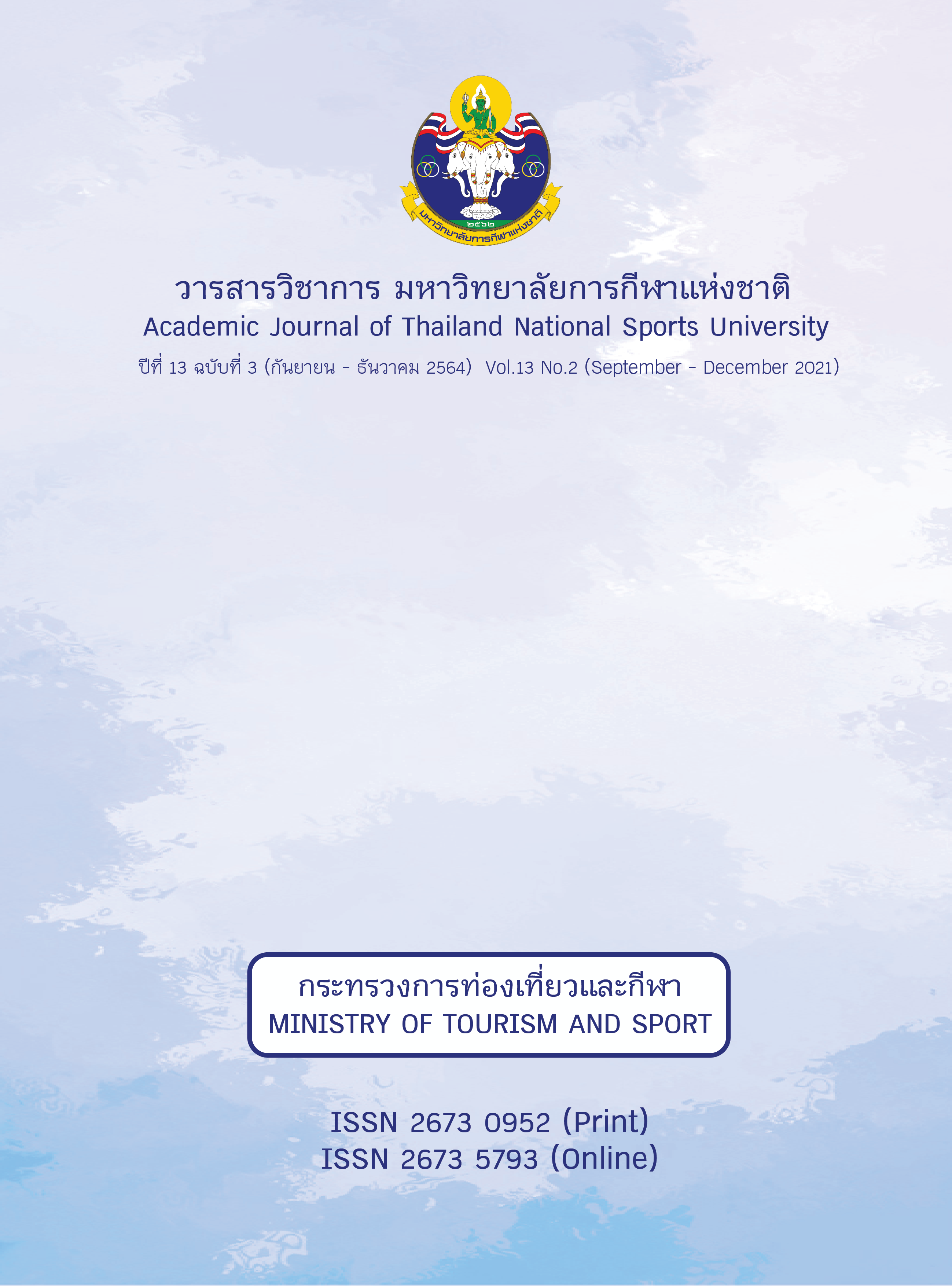EFFECTS OF HEALTH EDUCATION LEARNING MANAGEMENT USING HIGHER ORDER QUESTIONING TECHNIQUES ON LEARNING ACHIEVEMENT AND SYSTEMS THINKING OF TENTH GRADE STUDENTS
Main Article Content
Abstract
Purposes: To compare mean scores of learning achievement and systems thinking before and after implementation of an experimental group and a control group, and to compare mean scores of learning achievement and systems thinking after implementation between the experimental group and the control group. Methods: The subjects were 60 tenth grade students, divided equally into two groups: 30 of the experimental group was assigned to study under the health education learning management using Higher Order Questioning Techniques and 30 of the control group was assigned to study with conventional teaching method. The research instruments were comprised of 8 health education lesson plans using Higher Order Questioning Techniques with IOC of 0.99 and the data collection instruments included learning achievements in the area of knowledge, attitude, practice test and systems thinking test with IOC of 0.91, 0.97, 1.00 and 1.00, reliabilities of 0.82, 0.83, 0.84 and 0.81. The duration of the experiment was 8 weeks. Data were analyzed by mean, standard deviation and t-test (Paired-Sample t-test, Indipendent- Sample t-test). Results: The research findings were as follows: The mean scores of the learning achievement in the area of knowledge, attitude, practice and systems thinking of the experimental group students after learning were significantly higher than before learning at .05 level, and the mean scores of the learning achievement and systems thinking of the experimental group students after learning were significantly higher than the control group students at .05 level. Conclusion: health education learning management using Higher Order Questioning Techniques effect on learning achievement and systems thinking of tenth grade students higher than health education learning management with conventional teaching method.
Article Details
The published article is a copyright of the Academic Journal of Thailand National Sports University. The passage appeared in each article in this academic journal is a perspective of each author which is not related to the journal. Each author is required to be responsible for all components of his/her own article. If there are any mistakes, each author must be responsible for those mistakes on his/her own.
References
Anderson, L. W. and Krathwohl, D. R. (2001). A Taxonomy for learning, teaching, and assessing: A revision of Bioom’s Taxonomy of Educational Objectives. New York: Addison Wesley Longman.
Bureau of Acabeme Affairs and Educational Standards. (2008). Basic Education Core Curriculum 2008. Bangkok: The Agricultural Co-operative Federation of Thailand Press, LTD.
Child and Youth Development Annual Report 2017. (2018). Department of Children and Youth. Ministry of Social Development and Human Security. Retrieved from https://www.dcy.go.th/webnew/upload/download/file_th_20181211144021_1.pdf
Cronbach, Lee. J. (1990). Essentials of phychological (5th ed.). New York: Harper & Row.
Ebel, R. L., and Frisbie, D. A. (1986). Essentials of Educational Measurement. Englewood Cliffs, New Jersey: Prentice-hall.
Hill, J. B. (2016). Questioning technique: A study of instructional practice. Peabody Journal of Education, 91(5), 660 - 671.
Ittisak Sirichan. (2017). Effects of biology instruction using unified model on systems thinking ability and learning retention of upper secondary school students (Master’s thesis), Chulalongkorn University.
Jintana Sarayuthpitak. (2018). School Health Program (3rd ed.). Chulalongkorn University Press.
Khan, W. B. (2011). A study of lower-order and higher-order questions at secondary level. IER University of Peshawar, Pakistan. Asian Social Science, 7(9), 149 - 157.
National Statistical office. (2018). Executive summary: Survey of social, cultural and mental health systems 2018. Retrieved from http://www.nso.go.th/sites/2014/
Nitikorn Onyon. (2008). Effects of inquiry - based science instruction using higher-order questions on analyzing and synthesizing thinking ability of lower secondary school students (Master’s thesis). Chulalongkorn University.
Paramee Sriboonthip (2017). The confirmatory factor analysis of systems thinking of Mathayom Suksa 1 students at Public University Demonstration School under the Office of Higher Education Commission. Veridian E-Journal, Silpakorn University, 10(3), 38 - 51.
Pitukchai Bannalai. (2016). Effects of jurisprudential teaching model on media influence learning achievement and critical thinking of ninth grade students (Master’s thesis), Chulalongkorn University.
Ramsey, I., Gabbard, C., Clawson, K., Lee, L., & Henson, K. T. (1990). Questining: An effective teaching method. The Clearing House: A Journal of Educational Strategies, Issues and Ideas, 69(9), 420 - 422.
Senge, P.M. (1990). The Fifth Discipline: The Art And Practice of The Learning Organization. New York: Currency Doubleday.
Sirichai Kanjanawasee. (2013). Classical Test Theory (7thed.). Bangkok: Chulalongkorn University Press.
Sopa Choychod. (2017). Effects of health education learning management using problem-based learning and social information processing theory on learning achievement and problem solving abilities on cyberbullying behavior of eighth grade students (Master’s thesis), Chulalongkorn University.
Thai Health Report. (2019). Social media: A double - edge swords for thai health on social media. Institute for Population and Social Research Mahidol University: Amarin Printing and Publishing Public Company Limited.
Tissana Kaemanee. (2017). Science of Teaching: Knowledge for Effective Learning Process (21st ed.). Bangkok: Chulalongkorn University Press.
Tossaporn Srisang. (2017). Effects of using higher order question in teaching reading comprehension on awareness of Thainess of fourth grade students (Master’s thesis), Chulalongkorn University.

